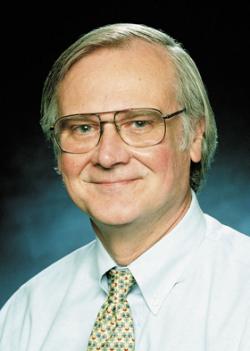
Blake S. Wilson, a pioneer in the development of cochlear implants who serves as a co-director of the Duke Hearing Center, will receive the 2013 Lasker-DeBakey Clinical Medical Research Award.
The Albert and Mary Lasker Foundation announced Monday that Wilson will share the award with Graeme M. Clark of Australia and Ingeborg J. Hochmair of Austria, who also played critical roles in developing the device that restores hearing to individuals with profound deafness. With continuous improvements in both hardware and software, cochlear implants have become widely used and have proven to be especially beneficial to children in recent years.
The Lasker Awards are among the most respected science prizes in the world. Eighty-three Lasker laureates have received the Nobel Prize, including 31 in the past two decades. In its announcement, The Lasker Foundation provided details about all of this year's laureates, who will be honored at a gala ceremony Sept. 20 in New York.
Melinda Gates, a recipient of Duke undergraduate and MBA degrees who served as a university trustee and delivered Duke's 2013 commencement address, is being honored by the foundation as well. She and her husband Bill Gates will receive the 2013 Lasker-Bloomberg Public Service Award for their contributions to improving health in the developing world and elsewhere.
"Duke University is immensely proud to have two members of its community honored in the same year with this prestigious award," said Duke President Richard Brodhead. "Blake Wilson and Melinda Gates both received undergraduate degrees at Duke and have maintained close ties with the university throughout their lives. On different career paths, they have made contributions that have transformed the lives of people around the world. They exemplify Duke's mission of providing knowledge in service of society."
In addition to leading the Duke Hearing Center with co-director Debara L. Tucci, M.D., Wilson is an adjunct professor in three departments at Duke: surgery, biomedical engineering, and electrical and computer engineering. His many other connections with Duke include helping to establish the Duke Cochlear Implant Program in 1984 -- one of the first such programs of its kind in the world -- and receiving the Distinguished Alumnus Award from the Pratt School of Engineering in 2007. Wilson also worked full-time from 1974-2007 at the Research Triangle Institute (now RTI International), with which Duke maintains close ties.
"The cochlear implant is one of the great innovations in modern medicine and has changed the hundreds of thousands of people worldwide who have benefitted from its use," said Victor J. Dzau, MD, chancellor for health affairs at Duke. "We are proud of Blake's key role in this project and for what it says about Duke's commitment to encouraging the translation of scientific innovations to patient care."
About 17 percent of American adults, or 36 million people, report some degree of hearing loss, including nearly half of those aged 75 years or older, according to the National Institutes of Health. Large numbers of children are also affected. Men are more likely to experience hearing loss than women, and the problem can range from difficulty hearing some high-pitched sounds to total deafness.
Many patients with severe hearing loss embrace deaf culture. The development of the cochlear implant provided new medical options for those seeking to restore hearing. Wilson developed many of the processing strategies used in present-day cochlear implant systems to translate sounds into electrical signals the brain can interpret. The devices send the signals directly to the auditory nerve, bypassing sensory hair cells in the ear that are often damaged or absent in patients who are deaf or severely hearing impaired.
"I am thrilled to win this magnificent award along with Graeme Clark and Ingeborg Hochmair," Wilson said. "Indeed, they are the foremost living pioneers in the development of the modern cochlear implant and I am proud indeed to be in their grand company."
Starting in the late 1960s, Clark and Hochmair demonstrated that tiny electrodes could be placed at different locations in the cochlea, or inner ear, and that different pitches could be produced through stimulation of the different electrodes. However, few patients using the early devices could understand speech without accompanying visual cues.
In the late 1980s, Wilson provided the next breakthrough by showing how the devices could yield more useful information from ever-changing auditory signals cascading across frequencies. His "continuous interleaved sampling" system made it possible for cochlear implant recipients to understand words and sentences with much greater clarity. It provided the basis for sound-processing strategies that are now used widely, launching a rapid expansion in the number of deaf and nearly deaf persons who have received a cochlear implant in one or both ears. Today, the large majority of cochlear implant users can talk on their cell phones and follow conversations in relatively quiet environments.
"As a Duke engineering alumnus and adjunct professor who has long collaborated with our faculty, Blake makes us very proud -- not only for the incredible contributions he has made through his work, but for the inspiration he is to the next generation of engineering students and trainees," said Tom Katsouleas, dean of the Pratt School of Engineering at Duke. "He truly shows the power of engineering innovation to make a dramatic difference in people's lives. We are thrilled that he has received this richly deserved honor."
In describing the winners' contributions, the Lasker Foundation wrote, "Brilliance and relentless commitment have fueled the reverberating success of Clark, Hochmair and Wilson. Less than a generation ago, deaf individuals had no hope of hearing again. These scientists have cracked the barriers that formerly isolated huge numbers of people from the realm of sound and have made many lives hum in new ways."